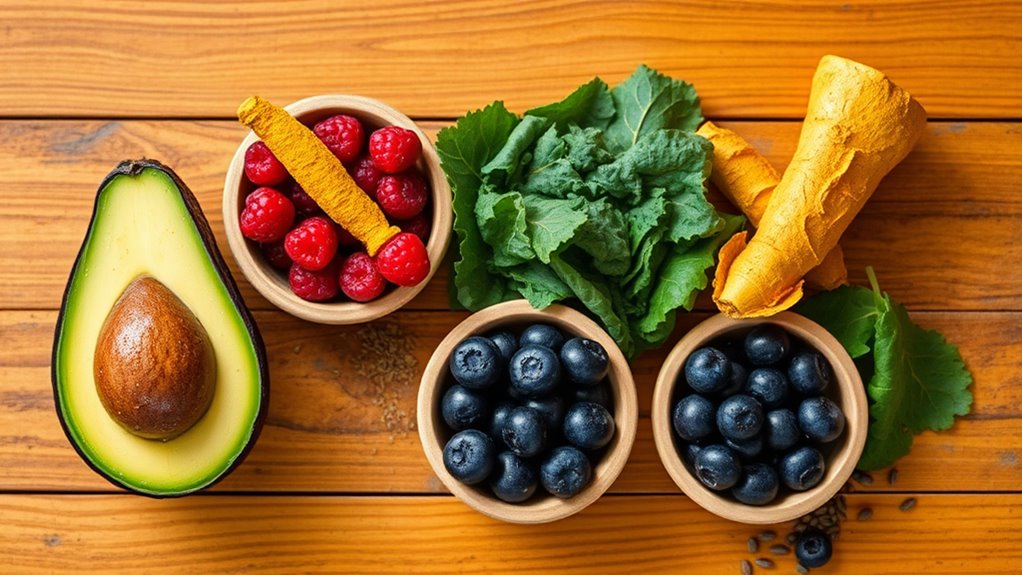5 Superfoods That Fight Inflammation Naturally
You might not realize that chronic inflammation can significantly impact your health, leading to various diseases. Fortunately, certain superfoods can help combat this issue naturally. Incorporating turmeric, blueberries, fatty fish, spinach, and ginger into your diet can provide powerful anti-inflammatory benefits. Curious about how these foods work and what specific advantages they offer? Let’s explore each of these superfoods and discover how they can enhance your overall well-being.
Key Takeaways
- Turmeric contains curcumin, which effectively combats inflammation and is best absorbed when combined with black pepper.
- Blueberries are rich in antioxidants like anthocyanins, reducing oxidative stress and lowering inflammation markers.
- Fatty fish provide omega-3 fatty acids that lower inflammatory cytokines, promoting heart health and muscle recovery.
- Spinach is packed with antioxidants and vitamins that support immune function and help regulate inflammation.
- Ginger contains gingerol, offering strong anti-inflammatory properties, alleviating pain, and enhancing digestion.
Turmeric
Turmeric, a vibrant yellow spice commonly used in cooking, has gained recognition for its potent anti-inflammatory properties.
You mightn’t realize that curcumin, its active compound, plays a crucial role in combating inflammation.
Research shows that incorporating turmeric into your diet can significantly reduce markers of inflammation, making it a staple among anti-inflammatory foods.
In fact, studies indicate that natural anti-inflammatory properties of curcumin can help alleviate chronic inflammation-related conditions.
Whether you add it to curries, smoothies, or teas, it’s easy to include turmeric in your meals.
Just remember, combining it with black pepper enhances curcumin absorption, maximizing its benefits.
Embracing turmeric can be a simple yet effective step toward managing inflammation naturally.
Blueberries
Incorporating a variety of colorful fruits into your diet can further enhance your anti-inflammatory efforts, and blueberries stand out as a top contender.
Rich in antioxidants, particularly anthocyanins, these tiny berries help combat oxidative stress and reduce inflammation. Research shows that regular blueberry consumption can lower inflammatory markers in the body, benefiting heart health and cognitive function. Plus, they’re versatile—add them to smoothies, salads, or yogurt for a tasty boost. With their low-calorie count and high nutrient density, blueberries not only satisfy your sweet tooth but also support your body’s ability to fight inflammation naturally. Additionally, incorporating anti-inflammatory foods into your diet can further amplify the benefits of blueberries.
Fatty Fish
Fatty fish, such as salmon, mackerel, and sardines, are powerhouse foods when it comes to fighting inflammation.
They’re rich in omega-3 fatty acids, which have been shown to reduce inflammation markers in the body.
Including these fish in your diet can lead to numerous health benefits.
- Omega-3 Fatty Acids: Help lower inflammatory cytokines.
- Vitamin D: Supports immune function and reduces inflammation.
- High Protein Content: Aids in muscle repair and recovery.
Incorporating fatty fish into your meals a few times a week can significantly enhance your anti-inflammatory efforts and promote overall health. Additionally, foods for brain health like fatty fish also contribute to cognitive sharpness and overall brain nutrition.
Spinach
When it comes to combating inflammation, spinach stands out as a nutritional powerhouse. Rich in antioxidants like quercetin and lutein, it helps reduce oxidative stress in your body. Spinach also contains high levels of vitamins A, C, and K, which support immune function and promote overall health. The presence of magnesium aids in regulating inflammation and maintaining cellular health. Additionally, spinach is considered one of the must-have superfoods that can enhance your diet and boost your health. Incorporating spinach into your diet can be as simple as adding it to salads, smoothies, or stir-fries. By making spinach a regular part of your meals, you’re taking a proactive step towards fighting inflammation naturally and enhancing your well-being.
Ginger
Ginger, a well-known spice with a rich history in traditional medicine, offers potent anti-inflammatory properties that can significantly benefit your health.
Incorporating ginger into your diet can help reduce inflammation and improve overall wellness. Research suggests that gingerol, the active compound in ginger, plays a key role in this effect. Additionally, studies have shown that ginger can act as a natural remedy for pain and inflammation, further underscoring its medicinal benefits.
- Supports joint health by alleviating pain
- Enhances digestion and reduces gut inflammation
- Boosts immune function and fights infections


